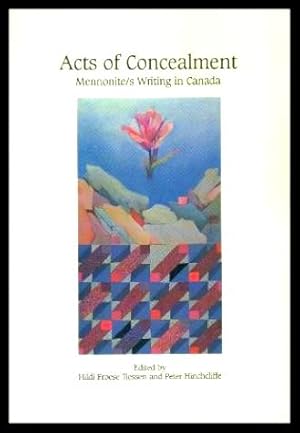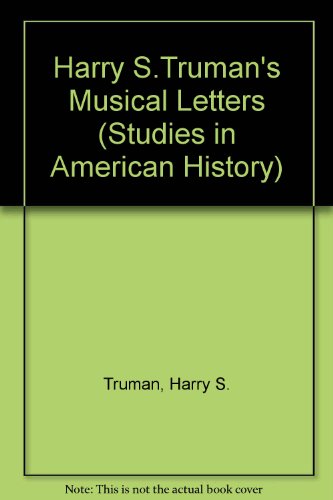brandt harry a editor (4 resultados)
Tipo de artículo
- Todo tipo de artículos
- Libros (4)
- Revistas y publicaciones
- Cómics
- Partituras
- Arte, grabados y pósters
- Fotografías
- Mapas
-
Manuscritos y
coleccionismo de papel
Condición
- Todo
- Nuevos
- Antiguos o usados
Encuadernación
Más atributos
- Primera edición
- Firmado
- Sobrecubierta
- Con imágenes del vendedor (1)
- Sin impresión bajo demanda
Ubicación del vendedor
Valoración de los vendedores
-
ACTS OF CONCEALMENT - Mennonite Writing in Canada
Publicado por The University of Waterloo Press, Waterloo, Ontario, 1992
ISBN 10: 0888981066ISBN 13: 9780888981066
Librería: W. Fraser Sandercombe, Burlington, ON, Canada
Libro Original o primera edición
Soft cover. Condición: Very Good. Erma Martin Yost; Ilustrador. First Edition. 244 pp. Trade paperback format. Lightly rubbed on the corners with a flat uncreased spine; no interior markings. Cover art by Erma Martin Yost. Writing by: Hildi Froese Tiessen; Sarah Klassen; Al Reimer; Victor G. Doerksen; Harry Loewen; David Waltner Toews; W. J. Keith; Magdalene Redekop; Clara Thomas; Di Brandt; Nancy Lou Patterson; Sara Stambaugh; Wayne Tefs; Patrick Friesen; David Arnason; Robert Kroetsch; and Rudy Wiebe. Size: 8vo. Book.
-
FUN IN THE NORTH WOODS Especially What Joyce and Haven Saw on a Trip to the North Country
Publicado por The Elgin Press, Elgin, IL, 1945
Librería: The Story Shop, Elwood, IN, Estados Unidos de America
Original o primera edición
Hardcover. Condición: Near Fine. Estado de la sobrecubierta: No Dust Jacket. First Edition. Nice photo book depicting vacation scenes, fishing, cabins, etc. ; 8vo.
-
Federal Reserve Policy-Making and Its Problems : Readings in Southern Finance, Number VII
Publicado por Federal Reserve Bank of Atlanta, Research Department, Atlanta, Georgia:, 1964
Librería: About Books, Henderson, NV, Estados Unidos de America
Original o primera edición
Paperback. Condición: Very Good condition. Atlanta, Georgia:: Federal Reserve Bank of Atlanta, Research Department, 1964. 8.5" wide by 11" tall. A little cover soil. No owner's name or bookplate. No creases. Pages are clean. No underlining. No highlighting. No margin notes. Contains a selection of 19 articles from the MONTHLY REVIEW OF THE FEDERAL RESERVE BANK OF ATLANTA, 1959-64. Bound in the original yellow gold wrappers. . First Edition? (No Additional Printings). Soft Cover. Very Good condition. (iv), 79pp. . First Edition? (No Additional Printings).
-
Harry S. Truman's Musical Letters; Studies in American History, Volume 30
Publicado por The Edwin Mellen Press, Ltd, Lewiston, New York, 2000
ISBN 10: 0773476512ISBN 13: 9780773476516
Librería: Ground Zero Books, Ltd., Silver Spring, MD, Estados Unidos de America
Libro Original o primera edición
Hardcover. Condición: Very good. Presumed First Edition, First printing. [12], v, [1], 127, [7] pages. Includes Illustrations. Foreword, Editorial Note, Preface, Acknowledgments, Epilogue, Notes, References, and Index. Cover has slight wear and soiling. Topics covered include Introduction, Dear Bess, 199-1918; Dear Margaret and Bess, 1932-1945; Presidential Letters, 1945-1950; Dear Mr. Hume (the Washington Post reviewer who criticized the piano playing of President Truman's daughter Margaret), Presidential and Former Presidential Letters, 1953-1972; and Three Musical Images. The Edwin Mellen Press, Ltd. is a non-subsidy academic publisher of books in the humanities and social sciences. Their sole criterion for publication is that a manuscript makes a contribution to scholarship. They publish monographs, critical editions, collections, translations, revisionist studies, constructive essays, bibliographies, dictionaries, reference guides and dissertations. This book presents for the first time over 100 selected letters with reference to music, written to Harry S. Truman's wife Bess, later to his daughter Margaret, and finally to a host of 20th century musicians, historical figures, and other important people, including Bob Hope, Eugene List, Joseph Kennedy, Jose Iturbi, Guy Lombardo, et al. As a single body, they trace the life of Harry Truman from the perspective of music. More intriguing is the tone of several letters from the late 1940s that clearly signals Truman's volatile letter to music critic Paul Hume. The record shows that Truman corresponded with Hume on several occasions after 1950. Finally, Truman's Musical Letters presents a full account of the Hume letter, from the time it was sent with a three-cent stamp on it to its current place in American history. The volume includes a selection of the public's letters to Truman in reaction. The theme of letters to Bess demonstrates that Harry S. Truman was a knowledgeable musician and pianist, and that he enjoyed attending performances of classical music. Margaret received from her father's letters a considerable amount of parental care, inspiration, advice, and prodding. And to others, Harry Truman revealed in his letters a passion for music, rather mature taste and insight, and good will. Music was an essential part of Harry Truman's life from the time he was a young boy. He learned to play the piano at age seven and took lessons from Mrs. E.C. White, a well-respected instructor in Kansas City. Mrs. White once took Harry to see the famous pianist Ignacy Jan Paderewski at the Shubert Theatre in Kansas City. After the concert, Paderewski gave Harry a short lesson backstage, an event that left a lasting impression on young Harry. At age 15 he gave up his piano studies, deciding he must "go to work and earn a living." As a young man, Truman attended many concerts and musicals in Kansas City and often took Bess on dates to the city. In 1912 he wrote to Bess, "How would you like to see the Orpheum road show in the afternoon and then go to dinner somewhere and then go to the Shubert? We could end up the season in one big splash." Throughout his life, Harry Truman played music, listened to music and discussed music with his family and friends. In 1951, President Truman reflected, "I am still very much interested in music and what it does for people. My daughter has some interest in music. My mother was very fond of music, and my father used to sing in the church choir. So I come by my love of music honestly." Truman was not fond of what he called "modern noise," preferring the traditional classical music of his youth. He collected many records over the years and kept them in his study next to his Magnavox phonograph. Speaking of his favorite composers he said, "[Now] we can get them all on records, of course, and I have several of those.great pianists of the past playing those wonderful things of Mendelssohn and Beethoven, Mozart and Bach and Chopin." The Trumans amassed a collection of over 680 records-some purchased by the family, others received as gifts. Much of the collection reflects the types of music the family enjoyed, including classical music and Broadway scores. Gifts were received from famous musicians and average citizens who shared Harry Truman's love of music and the piano.




